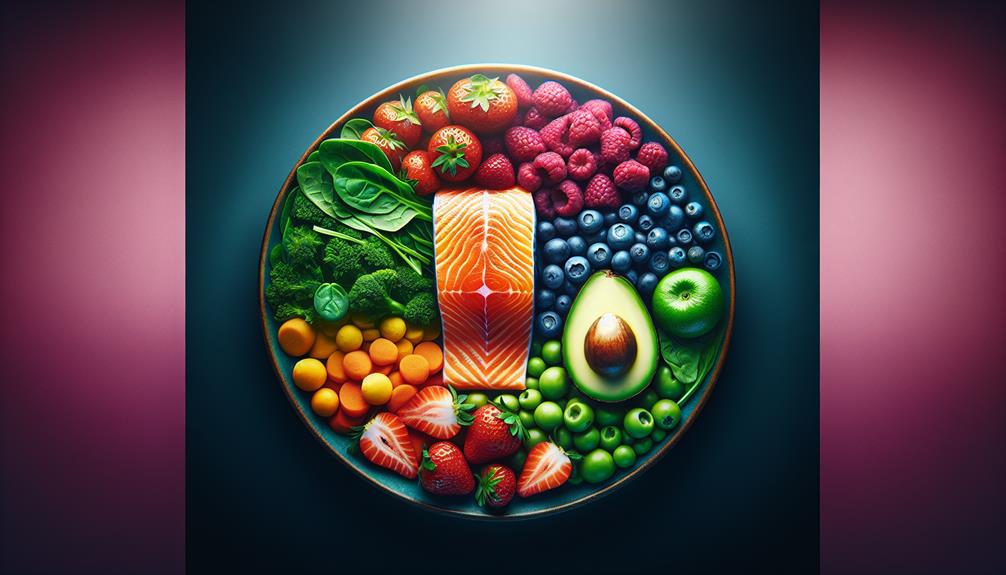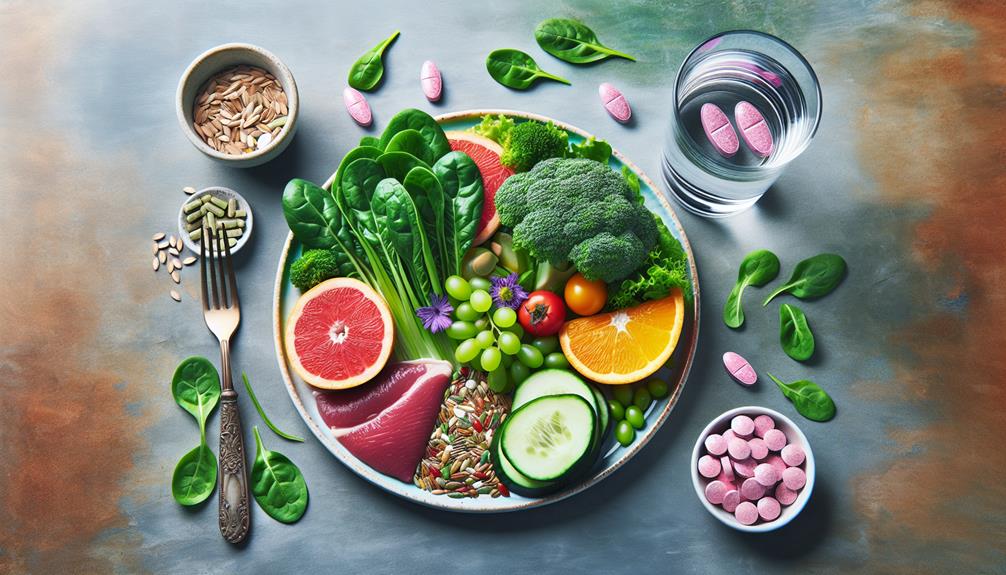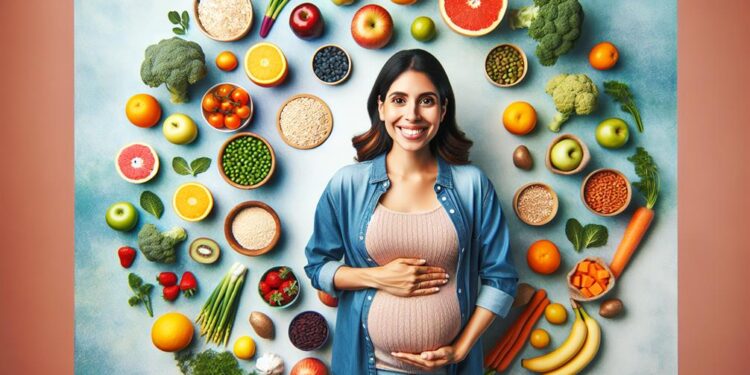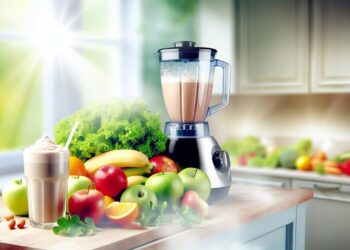Just like a well-tuned engine requires quality fuel to perform optimally, your body during pregnancy also needs proper nutrition to support both your health and the development of your growing baby. Ensuring you consume the right nutrients is crucial, not just for you but for your baby's well-being as well. But what exactly should you be eating to make sure you both stay healthy and strong? Let's explore the essential components of a balanced diet during pregnancy and how they can positively impact your journey to motherhood.
Key Takeaways
- Optimal nutrition during pregnancy is essential for maternal and fetal health.
- Key nutrients like folic acid, iron, calcium, and protein support fetal development.
- Prenatal vitamins help fill nutritional gaps and prevent deficiencies for a healthy pregnancy.
- A well-balanced diet and proper supplementation aid in preventing complications and promoting well-being.
Importance of Nutrition During Pregnancy
Ensuring optimal nutrition during pregnancy is crucial for the health and well-being of both you and your baby. Prenatal wellness plays a significant role in supporting a healthy pregnancy and reducing the risk of complications. Maternal nourishment is essential for the growth and development of the fetus, as well as for the mother's overall health.
During pregnancy, your body has increased nutritional needs to support the growing baby and to maintain your own health. Consuming a balanced diet rich in essential nutrients such as folic acid, iron, calcium, and protein is vital for a healthy pregnancy. Adequate intake of vitamins and minerals not only supports the baby's development but also helps prevent nutritional deficiencies in the mother.
Prioritizing maternal nourishment through a well-rounded diet can help prevent birth defects, support a healthy birth weight, and reduce the risk of gestational diabetes and preeclampsia. Remember, taking care of your nutritional needs during pregnancy is one of the best ways to ensure a healthy outcome for both you and your baby.
Key Nutrients for Maternal Health
To support your overall health and the development of your baby, focusing on obtaining key nutrients is essential during pregnancy. Iron supplementation plays a crucial role in pregnancy as it helps prevent anemia, supports the increased blood volume in your body, and aids in the proper development of your baby's brain and organs. Prenatal vitamins are specifically formulated to provide you with essential nutrients like folic acid, calcium, and vitamin D, which are vital for your health and the growth of your baby.
Iron is particularly important during pregnancy because your body's demand for iron significantly increases to support the production of red blood cells and prevent complications like preterm delivery. Prenatal vitamins complement your diet by filling in any nutritional gaps that may arise, ensuring that you and your baby receive the necessary nutrients for a healthy pregnancy. Remember to consult with your healthcare provider to determine the right type and dosage of prenatal vitamins and iron supplements for your individual needs.
Nutritional Needs for Fetal Development

For optimal fetal development during pregnancy, ensuring a balanced intake of essential nutrients is crucial. Fetal growth is a complex process that demands a variety of nutrients to support the formation of organs, tissues, and overall development. Key nutrients like folic acid, iron, calcium, and omega-3 fatty acids play vital roles in promoting healthy fetal growth. Folic acid aids in preventing neural tube defects, while iron supports the increased blood volume needed for the placenta and fetal circulation. Calcium is essential for bone development, and omega-3 fatty acids contribute to brain and eye development.
Nutrient absorption is also critical during pregnancy to ensure these essential components reach the developing fetus. Eating a diverse range of nutrient-dense foods and considering prenatal supplements when necessary can help support optimal absorption. Remember, your choices directly impact your baby's growth and well-being. By prioritizing a balanced diet rich in these key nutrients, you are providing the best possible environment for your baby's development.
Impact of Poor Diet on Pregnancy
Prioritize your health during pregnancy by being aware of the significant impact a poor diet can have on both you and your baby's well-being. Dietary deficiencies, such as inadequate intake of essential nutrients like folic acid, iron, calcium, and vitamins, can lead to serious implications for both you and your developing baby. Insufficient folic acid, for example, increases the risk of neural tube defects in the fetus. Iron deficiency may result in maternal anemia, contributing to fatigue and potential developmental issues in the baby.
Moreover, a poor diet during pregnancy can lead to various pregnancy complications. These may include gestational diabetes, preeclampsia, preterm birth, and low birth weight. Consuming excessive unhealthy foods high in sugar, refined carbohydrates, and saturated fats can also increase the likelihood of developing these complications.
Being mindful of your dietary choices and ensuring a well-balanced nutrition plan can significantly reduce the risk of these adverse outcomes, promoting a healthier pregnancy for both you and your baby.
Tips for Healthy Eating During Pregnancy

Ensuring a well-balanced diet rich in essential nutrients is crucial for maintaining optimal health during pregnancy. Meal planning plays a significant role in achieving this balance. Focus on including a variety of fruits, vegetables, whole grains, lean proteins, and dairy products in your daily meals. Planning ahead can help you meet your nutritional needs and manage weight gain effectively.
Cravings are common during pregnancy, and managing them is key to maintaining a healthy diet. While it's okay to indulge occasionally, try to balance cravings with nutritious options. For example, if you're craving something sweet, opt for a piece of fruit or yogurt. Listening to your body's needs while being mindful of your choices can help you navigate cravings without compromising your overall nutrition.
It's essential to stay hydrated by drinking plenty of water throughout the day. Water aids in digestion, helps prevent constipation, and supports the increased blood volume during pregnancy. Remember, small, frequent meals can also help manage cravings and keep your energy levels stable. By practicing mindful meal planning and cravings management, you can support both your health and your baby's development.
Frequently Asked Questions
Can Certain Foods or Nutrients Help Alleviate Common Pregnancy Symptoms Like Nausea and Fatigue?
Certain foods and nutrients can help alleviate common pregnancy symptoms like nausea and fatigue. Try herbal remedies for morning sickness and energy-boosting snacks for prenatal fatigue. Your well-being matters during this special time.
Are There Any Specific Foods Pregnant Women Should Avoid to Reduce the Risk of Foodborne Illnesses?
To ensure food safety during pregnancy, avoid unpasteurized dairy, undercooked meat, raw seafood, and deli meats. Take precautions by washing produce thoroughly and following storage guidelines. These restrictions reduce the risk of foodborne illnesses and support a healthy pregnancy diet.
How Does a Mother's Nutrition During Pregnancy Impact the Long-Term Health and Development of Her Child?
Nurturing your body with nutritious foods during pregnancy sets the stage for a lifetime of well-being for your child. Epigenetic influences from your diet impact developmental outcomes and nutritional programming plays a crucial role in ensuring lifelong health.
Can Supplements Like Prenatal Vitamins Replace the Need for a Balanced Diet During Pregnancy?
While dietary supplements like prenatal vitamins can help fill nutrient gaps, they should complement, not replace, a balanced diet during pregnancy. Micronutrients are vital, but whole foods offer additional benefits for your overall health and well-being.
Are There Any Specific Dietary Recommendations for Pregnant Women With Food Allergies or Intolerances?
Imagine a garden with diverse blooms; for your allergies, seek allergen-free alternatives. Embrace nutrient-rich substitutions like leafy greens, lentils. Consult a healthcare provider for tailored guidance on maintaining a balanced diet during pregnancy with dietary restrictions.
Conclusion
As you journey through pregnancy, remember that nourishing your body is like tending to a delicate garden. Just as flowers need sunlight and water to bloom, your baby relies on key nutrients for healthy growth. By making mindful food choices and prioritizing your well-being, you are laying a strong foundation for both you and your little one. Embrace this journey with love and care, knowing that every bite you take plays a vital role in supporting maternal and fetal health.













